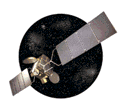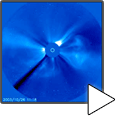Communication lost! Telstar 401
 On
January 6, 1997, the Sun released a huge
cloud of plasma called a Coronal Mass Ejection,
or CME, in the direction of Earth. Traveling
at about a million miles per hour, the
CME reached
Earth just four days later. On January
10 the CME slammed into Earth’s magnetosphere.
Lots of high energy particles became trapped
in Earth’s radiation belts, exposing
some orbiting geosynchronous satellites
to danger. On
January 6, 1997, the Sun released a huge
cloud of plasma called a Coronal Mass Ejection,
or CME, in the direction of Earth. Traveling
at about a million miles per hour, the
CME reached
Earth just four days later. On January
10 the CME slammed into Earth’s magnetosphere.
Lots of high energy particles became trapped
in Earth’s radiation belts, exposing
some orbiting geosynchronous satellites
to danger.
The
Telstar 401 satellite carried television
programming for a number of networks and
was lost soon after this storm event. Network
programming had to be quickly rerouted
to other satellites to avoid programming
outages. It is possible that the CME was
responsible for wiping out Telstar 401,
but without actually examining the satellite
it is hard to know with certainty.
The Halloween Storms of 2003
 In October and early November 2003, the Sun's atmosphere went through a period of great unrest, seldom seen in recent times. Massive flares and CMEs erupted from several giant Sunspot groups. By the end of the year, In October and early November 2003, the Sun's atmosphere went through a period of great unrest, seldom seen in recent times. Massive flares and CMEs erupted from several giant Sunspot groups. By the end of the year,  seven major solar storms occurred including the largest X-ray solar flare and the fastest moving CME every recorded. The storms caused communication disruptions. One of the CMEs was likely responsible for the failure of several communication satellites. Auroras could be seen as far south as the southern U.S. They also caused power outages in Sweden and disrupted airplane routes around the world. seven major solar storms occurred including the largest X-ray solar flare and the fastest moving CME every recorded. The storms caused communication disruptions. One of the CMEs was likely responsible for the failure of several communication satellites. Auroras could be seen as far south as the southern U.S. They also caused power outages in Sweden and disrupted airplane routes around the world.
Space
explorers are bathed in radiation
 In
one year, an unprotected astronaut on the
Moon’s surface would be exposed to
200 times the radiation dose allowed by
the EPA – the equivalent of 2,000
chest X-rays. If astronauts ever journey
to Mars, their spaceship will need warning
systems and safety areas to protect them
from solar disturbances. In
one year, an unprotected astronaut on the
Moon’s surface would be exposed to
200 times the radiation dose allowed by
the EPA – the equivalent of 2,000
chest X-rays. If astronauts ever journey
to Mars, their spaceship will need warning
systems and safety areas to protect them
from solar disturbances.
|